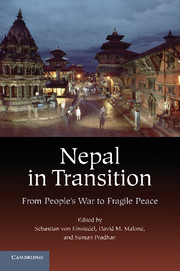Book contents
- Frontmatter
- Contents
- Contributors
- Acknowledgments
- 1 Introduction
- The Context
- 2 The Making of the Maoist Insurgency
- 3 State Power and the Security Sector: Ideologies and Interests
- 4 The Legacy of Nepal's Failed Development
- 5 Ethnic Politics and the Building of an Inclusive State
- Critical Transition and the Role of Outsiders
- Regional Dynamics
- Conclusions
- Index
- References
5 - Ethnic Politics and the Building of an Inclusive State
Published online by Cambridge University Press: 05 April 2012
- Frontmatter
- Contents
- Contributors
- Acknowledgments
- 1 Introduction
- The Context
- 2 The Making of the Maoist Insurgency
- 3 State Power and the Security Sector: Ideologies and Interests
- 4 The Legacy of Nepal's Failed Development
- 5 Ethnic Politics and the Building of an Inclusive State
- Critical Transition and the Role of Outsiders
- Regional Dynamics
- Conclusions
- Index
- References
Summary
In the course of the last two decades, ethnic politics in Nepal has received increasing attention in academia and the media. This is largely a reflection of the mobilization of marginalized ethnic, caste, regional, and religious groups after the democratic transition in 1990. The high rate of participation of ethnic and caste groups in the armed Maoist rebellion, launched in 1996, also highlighted ethnic grievances.
However, ethnic dynamics have always played a central role in Nepali politics. For most of the country's history, these dynamics were reflected in ethnic hegemony by one group – the caste hill Hindu elite (CHHE) – that discriminated against other ethnic, caste, and religious groups both culturally and economically and excluded them from formal politics. Dalits, indigenous nationalities, Madhesis, and Muslims were particularly discriminated against and repressed. Before the 1990s, tight control and effective oppression largely succeeded in suppressing public resistance, resulting in a deceptive façade of peace and ethnic harmony, which the state tirelessly propagated through school textbooks, an official narrative of Nepal's history, and the media. It was a “peace” based on hierarchy and inequality among groups and maintained through coercive force.
- Type
- Chapter
- Information
- Nepal in TransitionFrom People's War to Fragile Peace, pp. 129 - 152Publisher: Cambridge University PressPrint publication year: 2012
References
- 10
- Cited by



